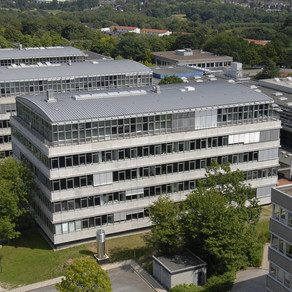Acoustic Quality and Health in Urban Spaces
What sounds do to unds
by Isabell Hilpert | 08/22/2018
Noise has been a topic of urban development for years. In the context of health research, however, it has so far been limited to the risk factor of noise. Soundscapes, on the other hand, encompass all audible sounds: natural, human, technical, and musical. In a MERCUR-funded project, the Center for Urban Epidemiology at Essen University Hospital and the Department of Spatial Planning at the Technical University of Dortmund are analyzing how soundscapes and health are related in the Ruhr region.
Cars, trains, airplanes: Motorized traffic is a major source of noise. The fact that it can make people ill - an increased risk of stroke or heart attack is assumed - has been investigated in many studies. However, little attention is paid to the effects of other noises or sounds. It would, however, be important to know how these are affected in order to be able to plan urban living spaces that are conducive to health in the future.
Building an urban soundscapes database This is where the Ruhr researchers' study comes in: Their goal is to typify urban soundscapes and analyze the health context. In doing so, one of the largest multi-seasonal urban soundscapes data sets will be established.
The results will then be merged with data from the population-based Heinz Nixdorf Recall (HNR) study, which is a long-term investigation of the health of people in the Ruhr region and urban risk factors.
Sound measurements in Bochum "We plan to conduct and categorize extensive time-, and space-related sound measurements. In addition, subjects will be interviewed about their preferences of soundscapes. Areas of investigation are urban districts of Bochum, since diverse health and social data from the HNR study are available for these sub-areas," says Prof. Dr. Susanne Moebus, head of the Center for Urban Epidemiology at the University Hospital Essen.
"Through interdisciplinary research of the complex interrelationships of health-related influences of a metropolitan region, numerous new results are obtained. They make a lasting contribution to the overall development of the city and health," says Prof. Dr. Dietwald Gruehn, Faculty of Spatial Planning at the Technical University of Dortmund.
With the funding of the project, MERCUR wants to help establish the targeted research area 'Healthy Urban Soundcapes'. This will strengthen the interdisciplinary competence field 'Metropolitan Research' of the University Alliance Ruhr.
Further information: Isabell Hilpert, Communications Manager Mercator Research Center Ruhr, Tel. 0201/616 965 11, isabell.hilpert(at)mercur-research.de.
Uni-Duisburg Essen: www.uni-due.de/2018-08-22-stadtgerausche-und-gesundheit






